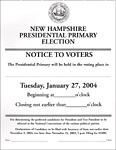

| Organization
Visits Updated frequently Links |
The New Hampshire Primary is set for Tuesday Jan. 27, 2004. "Granite Staters are tough but fair with those who would be President. Toward the end of the race, when the temperature gets colder and the campaigning gets hotter, it takes dedication to survive. Here is democracy at its best, for it takes more than a big bankroll or name recognition to impress us." --Nackey Loeb | ||||||||||

|
The Granite State at a Glance
General: State of New Hampshire | The New Hampshire Almanac | nh.com Population (2000):
1,235,786 U.S. Census Bureau QuickFacts
Local Government:
10 counties, 13
municipalities, 223 towns and 22 unincorporated
places. Cities
and
Towns.
Political: New Hampshire Democratic Party | New Hampshire Republican State Committee | Libertarian Party of New Hampshire | New Hampshire Greens| politicsNH.com | Politics1.com | New Hampshire Department of State | P2000 NH Primary Page Media: Concord Monitor's Primary Monitor | Union Leader | Newspapers in New Hampshire | Newspaper Links (NAA) | NHPTV | WMUR | WNDS | NECN | NHPR | Radio (Gebbie Press) Economy: NH Employment Security |
|
|
Visit
Early and Often New Hampshirites tend to get a little blasé about the presidential candidates who troop through their state. A cartoon by the Concord Monitor's Mike Marland captures some of this sentiment. The drawing shows an electronic clock and temperature indicator like one finds on the signs in front of some banks. However, in addition to the "Time" and "Temperature" settings, there is a third setting: "Presidential Candidate Visiting the State Today." Presidential hopefuls visit New Hampshire early and often, sometimes starting within months of the last election. The pace quickens following the mid-term congressional elections. In the year before the primary, the odds are good that on any given day a presidential candidate will be in the state, or, if not, there will be news about a visit that occurred yesterday or will occur tomorrow. New Hampshire's first in the nation presidential primary has assumed such importance not because of the number of delegates at stake (for example Puerto Rico sends more than twice as many delegates to the Democratic National Convention as does New Hampshire), but because it, along with Iowa, is the "starting block" in the presidential nominating process. A better than expected showing in New Hampshire can boost a candidacy; a poor showing can effectively end a candidacy. Retail Politics
Retail politics means making the rounds at Lincoln Day or Jefferson-Jackson dinners, delivering speeches to Rotary Clubs and party groups, and speaking with New Hampshirites in cafes, in school auditoriums and in their homes. It means attending numerous candidate forums. It means walking down Main Street, throwing an axe at a county fair or riding a dog sled or tapping a maple tree. Visit by visit, in beautiful fall New England days and in mucky snow storms, the candidates woo voters from Coos to the sea. They must also work to gain support of activists and elected officials who are critical to building an organization. There are many elected officials for candidates to choose from; the House of Representatives alone has 400 members, making it the largest of any state in the nation. As the year progresses, candidates open up state headquarters. The first television ads will likely appear in summer 2003. In the fall and winter of 2003 various candidate forums will be held and there will be a few debates. One or more of the candidates may not be able to generate enough support and end up pulling out of the race before the primary. In the closing weeks of the primary busloads of young supporters from around the country come in to help their favored candidates, and the media attention ratchets up. Finally, on primary day, January 27, 2004, with the eyes of the nation upon them, somewhere around 300,000 New Hampshirites will turn out at the polls (in 2000, with competitive primaries in both parties, 238,606 Republicans and 154,639 Democrats voted), and by their votes determine which candidates will go on, and which will not. The
Tradition An
Economic Bonanza Staying
First Nonetheless, there are always concerns about the future and health of the New Hampshire primary. New Hampshire's special position is not without critics (see for example the Nov. 2001 resolution (PDF) of the Michigan Democratic Party). Other states have on occasion attempted to impinge on the Granite State's first status. In-state observers keep a close watch on its pulse. For example, during the 2000 primary, Concord Monitor editor Mike Pride voiced qualms about the big media presence. "They're getting here sooner and sooner, so if somebody, a candidate, shows up… there's forty cameras around." |
Copyright © 2001, 2002, 2003, 2004 Eric M. Appleman/Democracy in Action.